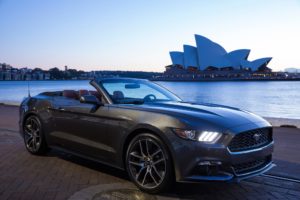
While on my own journey towards wealth accumulation, I notice that one of the biggest budget busters for families are automobiles. Now, I enjoy a nice fancy new car like the next person but to truly enjoy your car, I believe you have to be able to afford it and this includes the maintenance not just gas. Car ownership is more than just the purchase price. Forbes reported that the average U.S. cost of a vehicle in January 2016 was $34,112 – according to Kelley Blue Book (KBB).
A car is a car of course, of course. I know that new car smell is exhilarating. You slide in, adjust the seat, feel the smooth touch of the leather and sigh “I’m home.” One car is just as good as any other, right? However, we know that isn’t the case.
The most expensive car must be the better car because everyone knows you get what you pay for. Just cause the sticker price is higher does not make it the best vehicle or the right one for you. Let’s go down the list of what people are looking for in a car to do some comparison shopping.
Price. The first thing that comes to mind when buying a car is the cost. Understandably, so because if you decide to go with the fully loaded Range Rover versus a Ford Explorer, you better be prepared to live in it should you be unable to pay for both it and the rent. Doing an online search, I was able to look up the prices of both above-mentioned vehicles; a 2017 Ford Explorer could go for $31,160 and a 2016 Land Rover Range Rover costs…wait for it… a whopping $199,495!
There are some houses on the market that do not cost as much as a Range Rover. I also did the math for monthly payments. The Ford with a 3% interest rate would cost $509 per month for a grand total of $36,648 over 72 months. That’s 6 years! You know what could happen in 6 years; well neither do I, I’m not a fortune teller. Anything could happen, that’s why it’s best to keep car payments and terms as low as possible to be prepared for any unforeseen events.
As for the Range Rover, with the same terms as above, would cost $3,083 per month! There are mortgages for less. This is based on using the general 72-month term car dealers like to throw out there. For a final cost of $$221,976.
Just to put this into perspective, if you max out your 401(k) for 6 years, which is $18,000 for 2016, at a rate of return (ROI) of 6% annually you would have $125,697 in retirement savings.
Please don’t pick a car because of the after purchase champagne toast at one dealership versus the $50 gas card at another.
Miles Per Gallon. The Miles per gallon (mpg) can be especially important for anyone who does a lot of traveling. Even though gasoline prices have dropped over the past several years, it’s still not cheap to own a car or truck. According to Forbes, KBB stated that the lowest costs of ownership vehicles were Hyundai, Acura, General Motors, Toyota/Lexus and Ford.
Insurance. Indirect costs of ownership like insurance also need to be factored into the cost of buying. Luxury cars costs more to maintain and are more expensive to insure. Full coverage is the standard when buying new or used. These costs add up. Buying a cheaper car means saving on insurance and ultimately can be mitigated to your emergency savings or retirement account.
Safety. Let’s be honest. There are some vehicles that do not have the best safety features. If your new teenage driver is an eager beaver to get behind the wheel, then you may want to make sure your insured up to the hilt and that the car has airbags and anti-lock brakes. It is far more important to have a car that will stop on command than go from zero to 60 in 10 seconds.
The morale of this story: Pay smart, Drive safe.